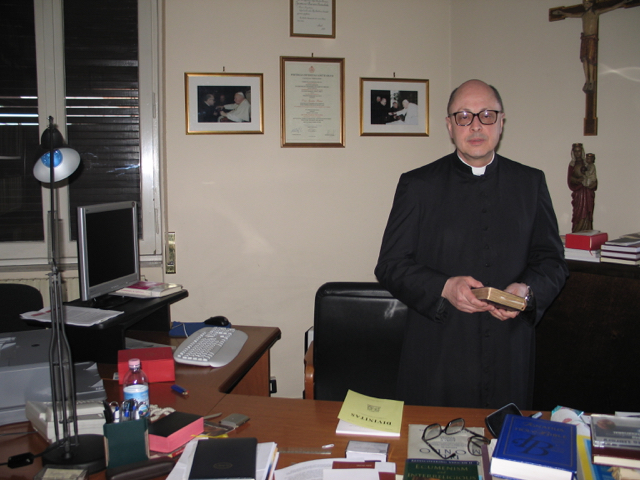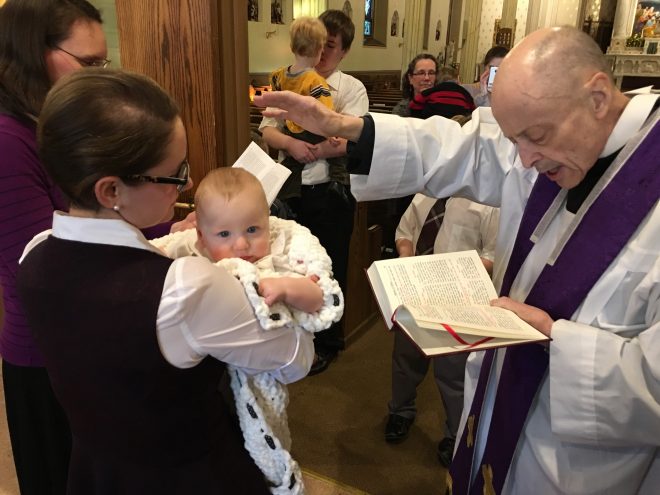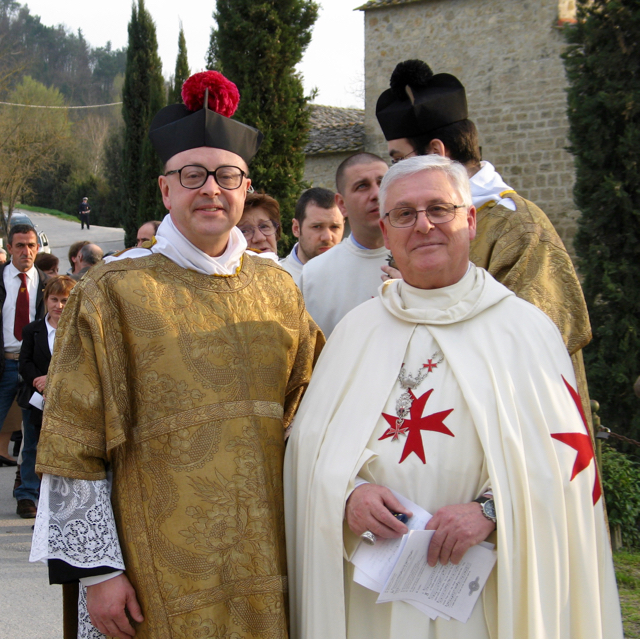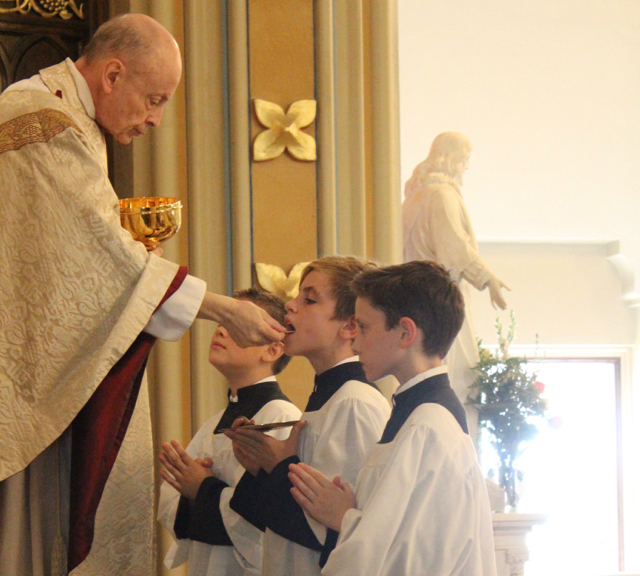
(Above) In the Rome office of HLI in 2006.
Monsignor Ignacio Barreiro Carámbula died early yesterday morning after a long illness. I had first met Fr. Barreiro (I will refer to him as such herein regardless of his status at any one time)as a seminarian in the 1980’s in New York. Trained as a lawyer, he had served in the delegation of Uruguay to the United Nations (one of his main activities being the promotion of the superiority of Uruguayan beef). He began to study for the priesthood at Dunwoodie seminary of the New York Archdiocese. Later, I would visit him at the first parishes he served in in New York City. We had so many wonderful conversations about the Church, European, Spanish and Latin American history, literature and politics. Fr. Barreiro was an inexhaustible gold mine of knowledge on all these topics and on many more besides. On all these matters he not just amassed ”factoids” but had formed well-reasoned opinions (with which you might or might not agree). These interests continued to the very end of his life – less than a week before his death Fr. Barreiro discussed with me the eccentricities of the late Duchess of Alba in Spain, and gave a detailed critique of Dreher’s recent book The Benedict Option, pointing out some of its fallacies.
Ordained in 1987, he always approached his priesthood with great seriousness. I recall a friend of his asking for his opinion of a certain individual “assuming for the moment you aren’t a priest.” But Fr. Barreiro said that it is exactly that he could never do – a priest is a priest all the time, you can never set the priesthood aside. At the same time, he took a dim view of clericalism. We had visited the now – destroyed church of Our Lady of Vilna (site of the first (Novus Ordo) Latin masses celebrated in New York since the 1960’s). The pastor recently had installed some large stained glass windows from a destroyed Lithuanian parish in Brooklyn – windows grossly out of scale for this very small church. “That’s what you get when a priest takes charge of the decorating the church’” said Fr. Barreiro, “instead of consulting laymen who know about art.” It’s an observation I have seen proved out many times since then. (By the way, Fr. Barreiro himself had very fine artistic taste.)
Fr. Barreiro was unfailingly polite and had a warm personality – a stark contrast to the affected, off-putting demeanor of certain of his Traditionalist clerical colleagues. He made many devoted friends who remained faithful to him for decades. He was comfortable dealing not just with clergy or alleged ”intellectuals,” but also with people of all walks of life who would come to him for counseling. Over the years he supported to a number of priests in various ways who were later active in the Traditional cause.
Fr. Barreiro had a great sense of dignity and propriety – sometimes manifested in a humorous way. We were wandering through city one summer when he was still a seminarian. He needed a light (he smoked but I didn’t) but at the time almost every local purveyor of tobacco products handed out matchbooks containing advertisements for prostitutes. Fr. Barreiro absolutely refused to use such a thing – so we had to stop in a half dozen or more such shops until he found a matchbook without the offending ad! And when he was transported from the hospital to Rosary Hill a week before his death, he insisted on being fully dressed in clerical attire.
Father Barreiro pursued his love for the Traditional Mass and for furthering his studies in Rome. There, after obtaining his doctorate, he became associated with Human Life International (HLI) and led for many years their Rome office from its beginning. His well-stocked library was a great resource for anybody in Rome who needed to know about pro-life issues. But he did so much more. He celebrated mass for a Traditionalist congregation in Rome. Like other priests of that generation who had received the “normal” training in the Novus Ordo and subsequently became supporters of Tradition, Fr. Barreiro remained very uncomfortable with the singing demands of the Traditional liturgy. Yet I can testify that he could do it – if pressed!
Fr. Barreiro spoke at conferences and wrote many books, sermons and articles – such as this paper he gave in 2011 on Summorum Pontificum at a conference sponsored by the Society of St Hugh of Cluny in 2011. To the end he remained a great friend of this society.
All his life Fr. Barreiro was deeply interested and involved in many organizations and causes of Catholic Traditionalism and of the European right: Carlists, monarchists, the Roman Forum, the ”restored” Knights Templar, etc. From the perspective of Catholics more in line with the political and ecclesiastical “establishment” such causes may seem “Quixotic” – given Fr. Barreiro’s background, a perhaps complimentary expression. But by now we must acknowledge that on so many issues these non-mainstream movements have proved right and the advocates of working through the existing establishment dead wrong.
(Above) At the headquarters of the “restored” Knights Templar at Poggibonsi near Siena (the Archbishop of Siena is the cleric behind the sacred ministers). (Below) with the master of the knights.
Fr. Barreiro was a man of strong opinions on controversial matters with a streak of stubbornness, which now and then brought him into conflict with various ecclesiastical authorities and other Catholic thinkers. But at the same time he could be very prudent and disposed of not inconsiderable diplomatic skill and talent. So, for example, he took care not to disclose, even in private conversation, the extent of his commitment to the Traditional mass until after his ordination. In 1989 Father Barreiro married Jill and me in Princeton, which was (I believe incorrectly) reported as the first “official” nuptial traditional mass celebrated in the United States in over 20 years. Fr. Barreiro had astutely managed the negotiations to make that seemingly impossible mass a reality. It was not totally surprising that Fr. Barreiro was made Monsignor in 2004 and even served as interim president of HLI in 2010-11.
He was fortunate to spend his last days in Hawthorne, New York, at Rosary Hill, a beautiful facility under the care of Dominican sisters. Up to the last day of his life he remained perfectly in command of his mental faculties. He here enjoyed the visit of so many people, including many parishioners of Saint Mary’s parish in Norwalk where he had served for almost a year. It was touching to see how great an impact he had left on so many people of the parish in so short a time. It is a great sorrow to lose such a true friend and a completely dedicated priest. But in return we will have, I devoutly believe, a great friend in heaven.
(Below is a formal obituary. A search of this site will bring up more sermons and news of Fr. Barreiro over the years.)
Funeral services are scheduled Tuesday, April 18, for Msgr. Ignacio Barreiro Carámbula , who died Thursday, April 13, 2017, in Rosary Hill Hospice, Hawthorne, NY. He was 69.
Msgr. Barreiro was born in Montevideo, Uruguay, Oct. 22, 1947, the son of the late Antonio Barreiro Brunel and Margarita Blanca Carámbula Regules. Schooled in Uruguay, he obtained a law degree and joined the diplomatic service of his country, where he was eventually stationed at the United Nations in New York City from 1978-1983.
He entered the Seminary and College of St. Joseph (Dunwoodie) in 1983, and was ordained priest by John Cardinal O’Connor at St. Patrick’s Cathedral, Nov. 22, 1987.
After parish work in New York, he entered the University of the Holy Cross in Rome, where he earned a licentiate and eventually a doctorate in 1997. In September 1998, he was appointed the first director the Rome bureau of Human Life International (HLI), founded in that year. In 2010-11 he briefly served as interim president of HLI. In 2004 he was named chaplain of his holiness by Pope John Paul II.
In April 2016, he became the parochial vicar at St. Mary’s Church, Norwalk, where he ministered especially to the Hispanic and other ethnic communities that make up the parish.
From the day of his ordination, Msgr. Barreiro was always an avid supporter of the restoration of the traditional rites of the Church, and was a regular celebrant of what is now called the Extraordinary Form.
Msgr. Barreiro’s body will be received into St. Mary’s Church, 669 West Ave. at 1 p.m. Monday, with Vespers of the Dead at 8 p.m. A Solemn Requiem Mass in the Extraordinary Form will be celebrated at 11 a.m. Burial will be at St. John’s Cemetery, Norwalk.
In lieu of flowers, donations may be made to St. Mary’s Church, 669 West Ave. Norwalk, 06850 or Human Life International, 4 Family Life Lane, Front Royal, VA 22630.
Celebrating Mass at St. Mary’s Norwalk, this past fall

A recent Baptism at St. Mary Church, Norwalk (courtesy of Susie Salazar)



Related Articles
2 users responded in this post